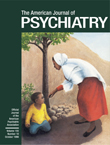Sex-Related Differences in Depressed Alcoholics
To the Editor: In their report comparing substance-induced and independent major depressive disorders in alcoholic subjects identified through the Collaborative Study on the Genetics of Alcoholism (1), Marc A. Schuckit, M.D., and colleagues commented that substance-related depressive disorders (26.4%) were more common than independent major depression (15.2%), confirming their hypothesis.
While this was true for the group as a whole, it is important to note that this generalization was not true for the women in the group. Judging by the data presented in table 3 of the article, among female subjects who satisfied diagnostic criteria for both depression and alcohol dependence, the authors found independent or primary major depression in 50.4% (233/462), while alcohol dependence was primary in 49.6% (229/462). In male subjects with both diagnoses, only 28.3% (216/764) showed primary major depression, while alcoholism was primary in 71.7% (548/764). This is a sex-related difference of considerable clinical importance.
Although the authors did report that women were more likely than men to show independent depression, looking at the sexes separately clarifies and reinforces this point. Much current clinical teaching in alcoholism treatment advises that depression can be expected to improve without specific treatment as abstinence is established. As Dr. Schuckit stresses in his own teaching, the clinician should establish a time line that locates the clinical onset of each disorder in so-called “dual diagnosis” patients before making such an assumption. This is especially important in women.
1. Schuckit MA, Tipp JE, Bergman M, Reich W, Hesselbrock VM, Smith TL: Comparison of induced and independent major depressive disorders in 2,945 alcoholics. Am J Psychiatry 1997; 154:948–957Link, Google Scholar



